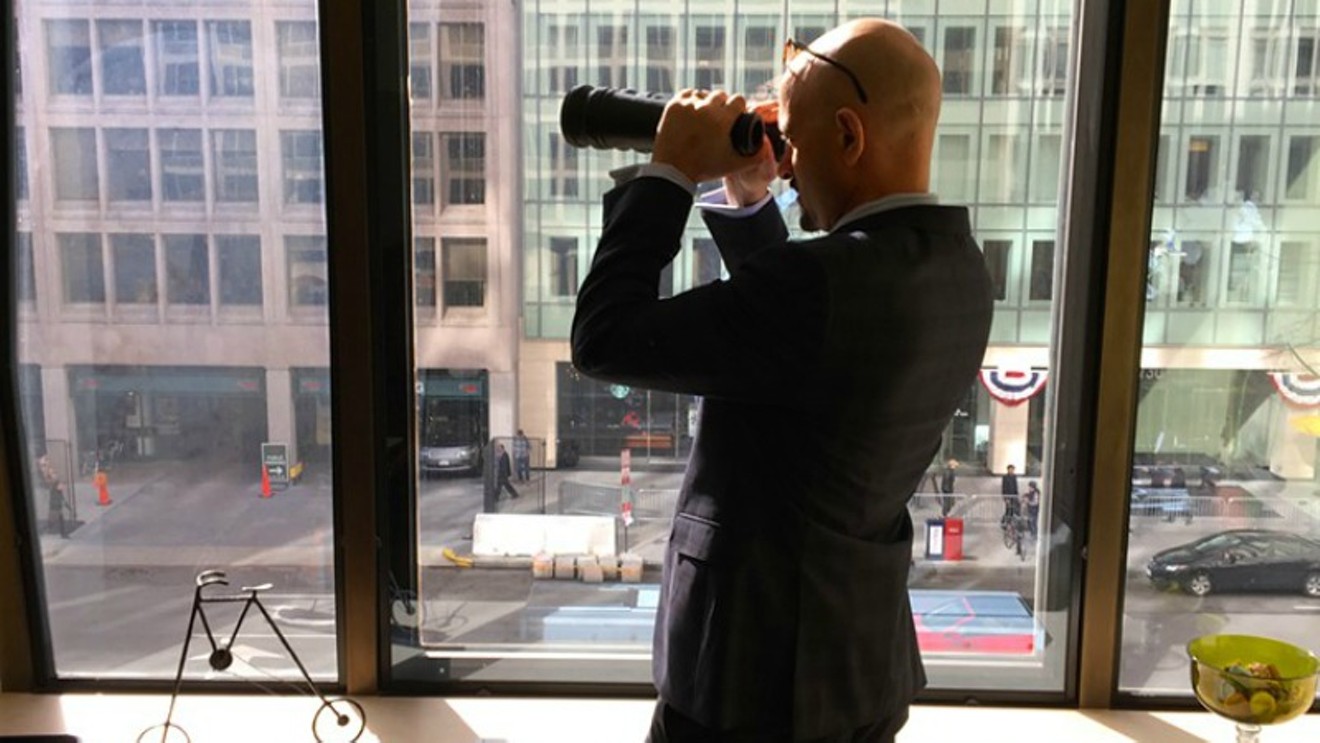On one of the walls were lists with the names of 255 individuals with arraignment hearings in courtroom C-10. All of them had been arrested the day before, January 20, during demonstrations that took place around the inauguration.
Over 230 of the individuals had been charged with felonies under the federal riot act, which can carry a sentence of up to ten years in prison.
I’d been in the middle of the action myself and had seen firsthand how demonstrators — some of them self-described anarchists — had launched an assault on banks, a Starbucks and a McDonald's. The tactic they'd used is known as “black bloc": when masses of people wearing masks, ski goggles and black clothing swarm in on targets, creating mass chaos. Later that day, during a second demonstration, multiple fires were set, including inside a limo, along K Street.
More than a hundred young activists, most wearing black, were crammed along the basement’s hallways; some were sprawled out on the floor sleeping. Many of them were acquaintances of those arrested and were waiting for the metropolitan police to transport the defendants from a nearby jail to the courtroom, where a judge would decide whether they’d be released. There were some parents there, too.Someone set the limo on fire. pic.twitter.com/y4AFr5HNjk
— Matt Pearce (@mattdpearce) January 20, 2017
This is where I found Jason Flores-Williams, the Denver attorney I'd been following throughout the weekend, at 3:30 p.m. on January 21. He’s also a registered member of the D.C. Bar.
From the time the courthouse had opened on Friday, Inauguration Day, Flores-Williams had taken on nine clients. Now judges were promising to get through all 250-plus names before the day was over, working until midnight if necessary.
“This is just disgusting,” the attorney said of the felony charges.
He explained that riot-act convictions are difficult for prosecutors to pull off, requiring proof beyond a reasonable doubt – such as distinguishable video or photography — that shows how a specific individual destroyed property or assaulted officers during a demonstration. Because the destruction on January 20 was carried out using black-bloc tactics, with the faces of demonstrators covered, such proof would be hard to come by.
“So they’re just doing this to punish and intimidate,” said Flores-Williams. “They’re sending a message.”
Because D.C. has special cross-jurisdiction with the federal government, Flores-Williams explained, the cases would list the U.S. government as the prosecutor. “So this is the USA versus...,” he said.
As he talked about the cases, the father of one Flores-Williams client asked him for an update. “It’s going to be at least a couple of hours,” the lawyer answered. “You don’t have to be here if you don’t want to. You can go get some lunch and relax for a bit. I’ll text you.”
The father hadn't been fully briefed on Flores-Williams's work here: While he's defending the accused for free, he's also shooting an episode for a TV pilot, and his defense of the man’s son will play into part of that narrative.

Flores-Williams among black-bloc demonstrators just before the 10:30 a.m. destruction on Friday morning.
Photo by Chris Walker
The concept of the show is that Flores-Williams will offer legal advice to those resisting various institutions and powerful people — not the least of whom is President Donald Trump.
The production of his pilot episode in D.C. this past week has been fascinating; particularly interesting has been some of the producers’ discussions about how to avoid making the show too contrived, like a scripted reality show.
While I’ve agreed to keep the name of the production company and network that ordered the pilot episode confidential because the show is not yet finalized, the commitment to making the series is serious: During his time in D.C., Flores-Williams was interviewed for hours to get overdub audio to splice into episodes for an entire first season.
His actions in D.C. also got attention from news outlets – though the resulting stories were not necessarily accurate. On January 21, the Washington Post published a story about the black-bloc anarchists that said a “volunteer lawyer from Colorado” had been with them and was arrested. Flores-Williams says that he contacted the paper and that the Post will issue a correction saying that he was not arrested.
On Monday, I got the following e-mail from Flores-Williams:
More than 230 activists were charged with felonies in the DC inauguration protests. We proudly handled arraignments and are now representing, pro bono, 9 of the Defendants. All of our clients are being prosecuted by the now Jeff Sessions-led United States Attorney's Office, i.e. the federal government (not the District of Columbia). This law office has the full intent of taking every case to trial as the felony rioting statute is constitutionally overbroad, violates constitutionally protected activists under the First Amendment and the government has no chance of satisfying its burden for conviction. The sole purpose of charging more than 230 democracy activists with dissent is to chill First Amendment rights and to send a message to the rest of the country that questioning and challenging this government will not be tolerated.Flores-Williams's defense of clients who may have taken part in January 20’s most chaotic disruptions is sure to be controversial. But that’s nothing new for Colorado’s gonzo lawyer.
The next hearing is scheduled March 15, 2017, in Superior Court in Washington DC. We will be fundraising in February for defense costs.
Given his ongoing lawsuits against Denver over the homeless sweeps and the urban-camping ban, his knack for stirring up trouble was already a known quantity.
On a national stage like Trump’s inauguration, that familiar script just had a bigger audience.














